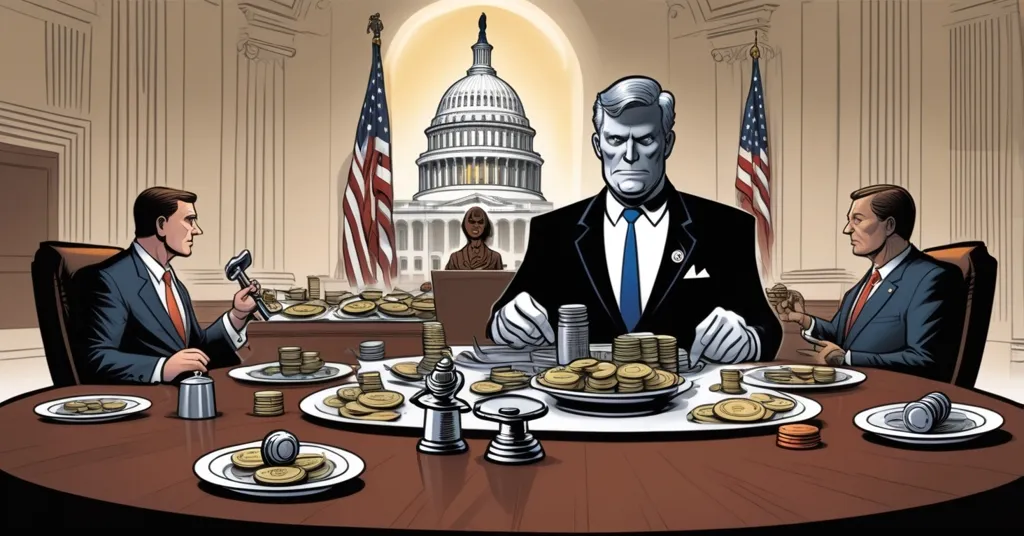Trump’s $TRUMP Memecoin Dinner Sparks Political Controversy and SEC Regulatory Shift

Trump’s $TRUMP Memecoin Dinner: Political Stir and Regulatory Shifts
Amid stalled stablecoin legislation, President Trump’s foray into cryptocurrencies with the $TRUMP memecoin has ignited controversy and sparked Democratic scrutiny, while the SEC moves towards clearer crypto rules.
- GENIUS Act delays stablecoin regulation
- Trump hosts $TRUMP memecoin dinner
- Democrats probe potential foreign influence
- SEC under Paul Atkins seeks clearer crypto rules
- GD Culture Group’s $300 million crypto investment
As the Senate remains silent on the GENIUS Act, a legislative proposal designed to regulate stablecoins, the future of these cryptocurrencies in the U.S. hangs in the balance. Stablecoins, digital currencies pegged to a stable asset like the U.S. dollar, continue to be issued by private companies without clear regulatory oversight. The GENIUS Act, which aims to address this, faltered in its last vote due to opposition from both Democrats and Republicans, and has yet to be rescheduled.
In the midst of this legislative standstill, President Trump has been making headlines with his engagement with the $TRUMP memecoin. This quirky cryptocurrency, inspired by internet memes and often lacking intrinsic value, has seen its top 25 wallet holders invited to a dinner at Trump’s Virginia golf club. However, more than half of these winners appear to be non-U.S. residents, raising concerns about potential foreign influence and the use of the memecoin for lobbying the President. Nothing says “I’m serious about cryptocurrencies” like hosting a dinner for memecoin millionaires.
Democrats, meanwhile, are actively responding to these developments. House and Senate members have called for investigations into Trump’s crypto ventures, citing concerns over potential bribery, influence-peddling, national security threats, and market manipulation. Their demands highlight the complex intersection of politics and finance in the crypto space, especially with memecoins like $TRUMP.
Amid this political theater, the SEC, under its new chair Paul Atkins, is working on clearer rules for cryptocurrency regulation. Atkins, who sees crypto assets as the next frontier in finance, has made it a priority to craft a more rational regulatory framework:
“A key priority of my SEC tenure will be to develop a rational regulatory framework for crypto asset markets that establishes clear rules of the road for the issuance, custody, and trading of crypto assets while continuing to discourage bad actors from violating the law.” – Paul Atkins, SEC Chairman
Atkins’ approach represents a significant shift from the SEC’s previous “head-in-the-sand” and “shoot-first” stances, potentially fostering innovation while protecting investors.
Adding to the crypto frenzy, GD Culture Group, a Nasdaq-listed company, has announced a staggering $300 million investment in $TRUMP and Bitcoin. This bold move, funded by a stock sale to an entity in the British Virgin Islands, comes despite the company reporting no revenue last year. It raises questions about the sustainability and motives behind such a strategy, especially in a company with no recent earnings to back it up.
Trump’s involvement in cryptocurrencies hasn’t been without its missteps. He was recently duped into promoting Ripple’s XRP, a cryptocurrency designed for cross-border payments, leading to temporary price spikes and subsequent fallout. The lobbyist behind this stunt, from Ballard Partners, was swiftly banished from Trump’s inner circle, highlighting the wild west nature of crypto promotions and the potential for manipulation.
From a Bitcoin maximalist perspective, while $TRUMP and other memecoins might capture headlines, Bitcoin remains the cornerstone of the crypto revolution. Its decentralized nature and limited supply continue to set it apart from the meme-driven volatility of altcoins. Yet, the broader crypto ecosystem, including projects like Ethereum, plays a crucial role in pushing forward the principles of effective accelerationism, driving innovation and adoption of decentralized technologies.
As the crypto landscape evolves, Trump’s engagement with cryptocurrencies, from $TRUMP to potential plans for his social media platform Truth Social, underscores the ongoing dance between politics and finance in this revolutionary space. While Democrats fume and the SEC shifts gears, the real question remains: will Congress ever get its act together on stablecoin regulation, or will the crypto world continue to outpace legislative efforts?
Key Questions and Takeaways:
- What is the current status of the GENIUS Act?
The GENIUS Act has not been rescheduled for a vote after failing due to opposition from both Democrats and Republicans, leaving stablecoin regulation uncertain.
- How is President Trump engaging with cryptocurrencies?
Trump is engaging through the $TRUMP memecoin, hosting dinners for top holders, and exploring other ventures like WLF and Truth Social.
- What concerns have been raised about the $TRUMP memecoin?
Concerns include potential foreign influence and the use of the memecoin for lobbying the President.
- What is GD Culture Group’s strategy regarding cryptocurrencies?
GD Culture Group plans a $300 million investment in $TRUMP and Bitcoin despite no recent revenue, raising questions about sustainability.
- How is the SEC’s approach to crypto regulation changing under Paul Atkins?
Paul Atkins aims to establish a clearer and more rational regulatory framework for crypto assets.
- What prompted Democratic lawmakers to seek investigations into Trump’s crypto ventures?
Democrats cited concerns over potential bribery, influence-peddling, national security threats, and market manipulation.
- What was the fallout from Trump’s promotion of XRP?
Trump felt misled into promoting XRP, leading to temporary price spikes and the lobbyist’s banishment from his circle.



